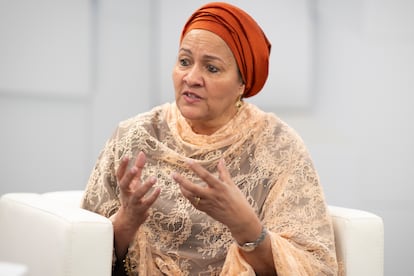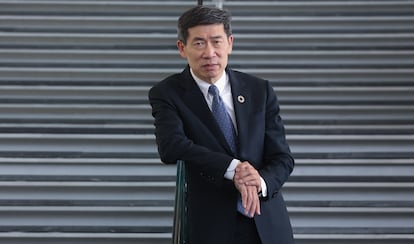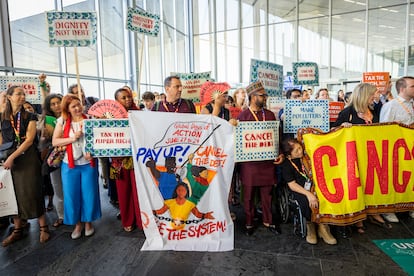The international community closes ranks in Seville against attacks on multilateralism and development financing

"It goes far beyond what we could have expected." The words of Nobel Prize winner in Economics Joseph Stiglitz , referring to the outcome of the UN development finance summit held this week in Seville, are not typical of these kinds of meetings. The second part of his statement, spoken during a chat with this newspaper in a hotel bar in the Andalusian capital, is key to interpreting the outcome of a summit attended by more than fifty heads of state and government.
The speakers painted a grim picture of the state of the world and the ravages of the financial system in the post-COVID era. One of disunity and geopolitical tension. But at the same time, the urgent needs emanating from this polycrisis have acted as a catalyst and a catalyst for action.
Faced with the onslaught against a flagging multilateralism, aid cuts, and the rise of every-man-for-himself in a climate of geopolitical tension, the international community has closed ranks in Seville. That's the feeling permeated these past four days in the halls of the exhibition center, echoed by some attendees, such as Stiglitz.
“We came to this conference amidst geopolitical tensions, so we were cautiously optimistic: we hoped to achieve something, but we didn't think we'd achieve so much, and we did,” reflects Amina J. Mohammed, UN Deputy Secretary-General, in an interview with this newspaper. During the closing ceremony on Thursday afternoon, Spanish Prime Minister Pedro Sánchez stated that “in the face of hate speech” and “in a divided world, we have conveyed a message of unity.”

Some of those consulted consider it a triumph in these times that the attendees were able to approve a document by consensus and launch more than a hundred concrete measures.
First COVID-19, then the war in Ukraine, rising interest rates, trade barriers, and now cuts in development aid have led to an acute crisis. The growing influence of private creditors and exorbitant interest rates on states, along with the emergence of lenders such as China and the Gulf countries, have further aggravated the situation.
The result is a funding gap of four trillion euros annually to achieve the development goals, according to UN estimates, and a debt that forces 3.4 billion people to live in countries where they pay more on debt than on education and healthcare. This was precisely one of the central themes of this conference.
Stiglitz compares Seville with the previous meeting of this type, held in Addis Ababa, Ethiopia, 10 years ago. "Back then, the discussion was very general. In Seville, specific measures were approved." Specifically, 130 measures are grouped under the umbrella of the so-called Seville Platform for Action. Debt swap programs, the Spanish-Brazilian initiative to tax the super-rich, the creation of the Seville Forum for debtor countries to defend their interests, a debt pause in the event of climate disasters, and a tax on private aviation are some of the proposals that have begun to emerge at this summit.
Absence of the United StatesThis has been possible, in the opinion of those interviewed, thanks to the absence of the United States. The Donald Trump administration withdrew from the pre-summit negotiations on the final document and was not present in Seville. What was discussed here—cooperation, development aid, combating the climate crisis, higher taxes for the super-rich, gender equality, and so on—is at odds with the interests and worldview of the US government. “The United States is almost always a problem in global negotiations. When the government is Democratic, it's almost worse, because they are afraid of returning home and being accused of having ceded sovereignty,” the American economist believes. By not being present, they have not struggled to water down the text or seek allies against its adoption. “No one has followed them this time, because countries have realized they need multilateralism.”
Mohammed agrees that Washington's absence "paradoxically allowed for a consensus to be reached without the need for votes or confrontation." But he is clear that it won't last forever. "The door remains open, and we must continue to engage with them so they can return to the table on important issues. They are on the boards of international financial organizations and participate in bilateral cooperation," he recalls.

“The question is how not to repeat the mistakes of the past, in which commitments or promises were made that were not fully fulfilled. That's why the Seville Platform for Action is important,” says Haoliang Xu, acting administrator of the United Nations Development Programme (UNDP). He believes that one of the new elements of the Seville Platform is the concern about the debt burden and the need to offer some possibilities for debt relief, so that borrowing countries can make their voices heard more effectively. There is also a call for the UN to assume greater responsibility on this issue, and Secretary-General António Guterres has expressed his intention to establish a working group on the subject shortly.
The administrator explains, for example, that his organization is "working to support the initiative with the OECD for Tax Inspectors Without Borders, which deals with the auditing of the repatriation of income from developing countries by multinational companies." "In recent years, we have helped countries generate between $2.3 and $2.4 billion in revenue, domestic resources, and tax revenue," he adds. He has no doubt that "Spain has provided important and highly symbolic leadership by organizing this conference at a critical moment." "I believe Seville will go down in the history of development financing," he says.
Ilan Goldfajn, president of the Inter-American Development Bank (IDB) , agrees that “one of the achievements of this conference is that it has been very concrete.” “People want to get to the details, the numbers; even the ministers have been more specific and participated in the technical events,” he asserted during an interview with EL PAÍS. Goldfajn is convinced that the “four trillion dollars annually” needed to cover the financial gap and meet the Sustainable Development Goals by 2030 exist, but warns that they are not so easy to attract. “They are in pension funds, in insurance companies, in the hands of those who seek stability and avoid risk, but invest very little in development.” The challenge, he asserts, “is to transform projects into something that these actors can consider viable and in which they see an acceptable risk.” Finding formulas to mobilize private capital in times of public funding cuts has been another of the major themes of the meeting.
Goldfajn explains that, for example, the IDB has presented "three platforms" they were already working on "and where there was already progress," because they wanted to "bring them from Latin America and the Caribbean to the rest of the world." One of them, FX EDGE, seeks to eliminate "exchange rate volatility," which is one of the main barriers to private investment in countries of the Global South. "In Brazil, we provided money that served to create a liquidity fund, we held an auction, and $8 billion was submitted," he describes as an example of measures that have already proven effective.
The international organization Oxfam Intermón, like other civil society representatives, has been more critical of the conference's outcome. "The richest countries have shirked their responsibility to act on the growing debt crisis," said Franc Cortada, the NGO's general director. "There is enough money to end poverty, but it's in the hands of a few wealthy people in the North," said Cortada, who did highlight the Spanish-Brazilian initiative to require the super-rich to pay more taxes as a breakthrough from the summit.

In response to criticism, Stiglitz, who co-chairs the Vatican Jubilee Commission on Debt, believes that "Seville has highlighted the fact that we are facing a systemic problem and a corrupt system in which multilateral banks or the International Monetary Fund end up indirectly bailing out private banks that hold debt." "Seville has set us on the right path," he concludes.
EL PAÍS





